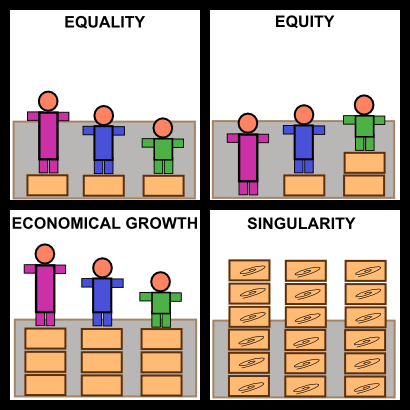New Comment
Reading about at the equality/equity meme, I have two more ideas, but I am too lazy to draw them.
- Make a version of "equality/equity" such that the fence is higher. In the first picture, only the tallest person can see the game. In the second picture, no one can. (Sometimes, life sucks.)
- Make "equality / equity / economical growth". In the third one, everyone can see because there are more boxes... but given the labels, that's exactly the point. (Extreme version, the fourth window is "singularity". Could be a nice one with infinite fractal boxes and some characters turned to androids, or the version with paperclips, like maybe more boxes with a picture of paperclip on them and no humans.)
Generally, the article was enjoyable. It's fun to see how many variations of the meme people can make. Also funny how some will fail to understand the point... from "redistribution" to "new boxes magically appearing"; yeah, it would be great if we could solve the world's problems by magically creating extra resources for those who need them, but how the fuck is that relevant to the original "equality/equity" dilemma? And the educational version where the tallest (smartest?) kids do not get great teachers is not exactly encouraging.
Okay, here is my contribution to the memetic pool of humanity:

Top recommendation of the month: Pages 42-44 of the Joint Inspector General Inspections Guide, used by Inspectors General in the Department of Defense to understand and analyze policy failures. They identify a simple framework for understanding failure to follow policy (which is often, in the DoD, at least arguably a criminal offense):
Can’t comply: don’t have the resources; time; or knowledge, skills, and abilities
Won’t comply: don’t see the policy as important or valuable, the punishments for failure to comply are lighter than the burden of complying, etc
Don’t know the policy exists: a fun question to track bureaucracy in your society is how much paperwork would be needed to set up a lemonade stand legally. How much of it can a 10 year old know?
I like this framework because it starts to break down the human factors involved in policy failure, which are constant and numerous.
History
An entertaining alternate history of Wakanda
Fascinating piece from Techdirt on free speech, and the differences between a bar and an enterprise software provider, on the subject of Substack Notes. The question of “what rules and norms needed to be in place to allow the modern gay rights movement, and how do we protect those rules and norms from current anti-liberals” is of deep importance to me. I’ve seen the political winds shift back and forth, over the years, and right now the consensus among dominant factions on both parties is relatively anti speech that they don’t like and pro speech that they do. This is pretty common, admittedly, but you can track how people are more or less blatant about it.
Ultimately, I find the difference that the writer draws persuasive for considerations on when a private company that genuinely believes in free speech should restrict it. In short, in a bar you can’t control who else you’re interacting with once inside, while an enterprise software provider imposes no additional requirements to speak or interact with fellow customers). However, I think that Substack Notes comes down on the other side of it.
You’re probably familiar with the following meme. So here’s a fun little history of how it was modified through the bowels of the internet.
Oh Money Money
From the report by the Federal Reserve, on the collapse of SVB, which was taken over this weekend by another bank. One framing of the issue that I think is interesting is that SVB grew much faster than the Fed is used to banks growing.
Fascinating image from a report on family offices: firstly, the places where family offices, the investment and odd jobs companies for the extremely wealthy (9 figures in wealth for the family), are categorized into US, Latin America, China, Western Europe, Middle East and Africa and Asia-Pacific. Eastern European extremely wealthy people don’t have family offices, they have [redacted so I don’t
Secondly, Chinese family offices put three fifths of their money into Western Europe.
Personal Updates
I wrote Ending Open Philanthropy Project, an April Fools day post on the EA Forum. Self-recommending.
I am working on a list of 100 short stories and essays, aimed at people who say that they want to read more classics but don’t have the time. Recommendations welcome, particularly for more of a global perspective. That is, I am *reliably* informed that there exist countries other than Russia and America, possibly even entire regions that might contain as many as three authors. I don’t promise to include them, but I do promise to read them.
Taking on this project has been intensely educational for me, and I recommend giving it a stab yourself. You can go for 50, if you want, and lean more to your personal taste than “objective” standards. I’ve noticed places where I’m missing people, been reminded of authors I’m neglecting, and more.
If you’re just going to read one, I think I will go for my abuse of Bible Gateway to create “abridged” versions of Genesis and Matthew. 8,000 words each, they try to get across as many biblical references that you are likely to encounter in later work as possible.
I have some upcoming travel: I will be in London for EA Global May 17-22, in DC May 23-30 for some RAND work. Shoot me a message if you want to meet up!